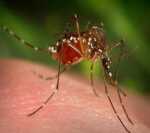Elmore County man has West Nile Virus

An Elmore County man in his 50s has tested positive for West Nile virus (WNV), Central District Health Department announced Tuesday afternoon.
It is the third human case of West Nile fever reported in Idaho for 2012. The man is still recovering from his illness. For privacy reasons he has not been identified.
Since mid-July, eight Idaho counties have reported West Nile virus activity in local mosquitoes.
"We're starting to see an uptick in West Nile activity with more positive mosquito pools and the state's third human infection," says Sarah Correll, Epidemiologist at Central District Health.
"With this increased activity it's important to 'fight the bite' and protect yourself and your family."
West Nile virus is usually contracted from the bite of an infected mosquito. It is not spread from person-to-person through casual contact.
Symptoms of infection often include fever, headache, body aches, nausea, vomiting, and sometimes swollen lymph glands or a skin rash on the chest, stomach and back. In some cases the virus can cause severe illness, especially in people over the age of 50.
Last year, three Idahoans were reported with WNV infections. In 2006, Idaho led the nation in West Nile illnesses with almost 1,000 infections, which contributed to 23 deaths.
According to the Centers for Disease Control and Prevention (CDC) 390 human cases of West Nile virus disease have been reported nationally, including eight deaths, as of August 7, 2012. Most were in Texas. This is the highest number of cases for the first week of August since 2004.
To reduce the likelihood of infection, people are advised to avoid mosquitoes, particularly between dusk and dawn when mosquitoes are most active. In addition, you should:
* Apply DEET or other EPA-approved insect repellent to exposed skin and clothing. Carefully follow instructions on the product label, especially for children;
* Cover up exposed skin when outdoors;
* Insect-proof your home by repairing or replacing screens; and
* Reduce standing water on your property. Check and drain toys, trays or pots which may hold water. Change the water in bird baths and static decorative ponds weekly as they may provide a suitable mosquito breeding habitat.
West Nile virus does not usually affect domestic animals, but can cause severe illness in horses and certain species of birds. Although there is no vaccine available for people, there are several vaccines available for horses. People are advised to vaccinate their horses annually.
For more information, visit www.westnile.idaho.gov.
